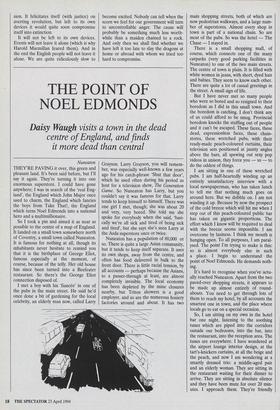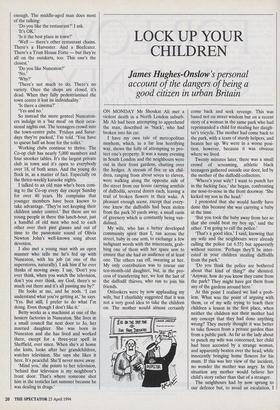THE POINT OF NOEL EDMONDS
Daisy Waugh visits a town in the dead
centre of England, and finds it more dead than central
Nuneaton THEY'RE PAVING it over, this green and pleasant land. It's been said before, but I'll say it again. They're turning it into one enormous superstore. I could have gone anywhere; I was in search of the 'real Eng- land', the England which John Major once used to charm, the England which fancies the boys from Take That!, the England which turns Noel Edmonds into a national hero and a multimillionaire.
So I took a pin and aimed it as near as possible to the centre of a map of England. It landed on a small town somewhere north of Coventry, a small town called Nuneaton. It is famous for nothing at all, though its inhabitants never hesitate to remind you that it is the birthplace of George Eliot, famous especially at the moment, of course, because of the telly. Her old house has since been turned into a Beefeater restaurant. So there's the George Eliot connection disposed of.
I met a boy with his 'fiancée' in one of the pubs in the main street. He said he'd once done a bit of gardening for the local celebrity, an elderly man now, called Larry Grayson. Larry Grayson, you will remem- ber, was especially well-known a few years ago for his catch-phrase 'Shut that door', which he used often during his period as host for a television show, The Generation Game. So Nuneaton has Larry, but you couldn't say it was famous for that. Larry tends to keep himself to himself. There was one girl I met, though; she was about 20 and very, very bored. She told me she spoke for everybody when she said, 'basi- cally we're all sick and tired of being sick and tired', but she says she's seen Larry at the Asda superstore once or twice.
Nuneaton has a population of 80,000 or so. There is quite a large Asian community, but it tends to keep itself separate. It uses its own shops, away from the centre, and often has food delivered in bulk to the front door. There is little racial tension, by all accounts — perhaps because the Asians, to a passer-through at least, are almost completely invisible. The local economy has been depleted by the mine closures nearby, but Triton showers is a good employer, and so are the numerous hosiery factories around and about. It has two main shopping streets, both of which are now pedestrian walkways, and a large num- ber of superstores. Almost every shop in town is part of a national chain. So are most of the pubs. So was the hotel — The Chase — I stayed in.
There is a small shopping mall, of course, which connects one of the many carparks (very good parking facilities in Nuneaton) to one of the two main streets. The centre of town is plain. It is filled with white women in jeans, with short, dyed hair and babies. They seem to know each other. There are quite a lot of casual greetings in the street. A small sign of life.
But I have never met so many people who were so bored and so resigned to their boredom as I did in this small town. And the boredom is catching. I don't think any of us could afford to be smug. Provincial boredom knocks the stuffing out of people and it can't be escaped. These faces, these dead, expressionless faces, these chain- stores, these wretched pubs, with their ready-made peach-coloured curtains, their television sets positioned at jaunty angles above the bars, all spewing out sexy pop videos in unison, they force you — us — to do the oddest of things.
I am sitting in one of these wretched pubs. I am half-heartedly winding up an entirely unsatisfactory interview with a local newspaperman, who has taken lunch to tell me that nothing much goes on around here. But we dribble on. I am not winding it up. Because by now the prospect of the cold breeze which will hit me when I step out of this peach-coloured public bar has taken on gigantic proportions. The effort which I know will be required to deal with the breeze seems impossible. I am overcome by laziness. I think my mouth is hanging open. To all purposes, I am paral- ysed. The point I'm trying to make is this: so is almost everybody else in such a place. I begin to understand the point of Noel Edmonds. He demands noth- ing.
It's hard to recognise when you've actu- ally reached Nuneaton. Apart from the two paved-over shopping streets, it appears to be made up almost entirely of round- abouts. You need to get through lots of them to reach my hotel, by all accounts the smartest one in town, and the place where locals go to eat on a special occasion.
So, I am sitting on my own in the hotel bar one night, listening to the soothing tunes which are piped into the corridors outside our bedrooms, into the bar, into the restaurant, into the reception area. The tunes are everywhere. I have wondered at the airport lounge interior design, at the tart's-knickers curtains, at all the beige and the peach, and now I am wondering at a smartly dressed trio: a middle-aged pair and an elderly woman. They are sitting in the restaurant waiting for their dinner to arrive. They are sitting in absolute silence and they have been mute for over 20 min- utes. I approach them. They're friendly enough. The middle-aged man does most of the talking: `Do you like the restaurant?' I ask.
`It's OK.'
`Is it the best place in town?'
`Well — there's other restaurant chains. There's a Harvester. And a Beefeater. There's a Trust House Forte — but they're all on the outskirts, too. This one's the closest.'
'Do you like Nuneaton?'
`No.'
'Why?'
`There's not much to do. There's no variety. Once the shops are closed, it's dead. When they fully pedestrianised the town centre it lost its individuality.'
`Is there a cinema?'
`Yes and no.'
So instead the more genteel Nuneaton- ers indulge in a tar meal' on their occa- sional nights out. The teenagers crowd into the town-centre pubs. 'Fridays and Satur- days they're packed,' I'm told. 'You have to queue half an hour for the toilet.'
Working clubs continue to thrive. The Co-op club has nearly 5,000 members and four snooker tables. It's the largest private club in town and it's open to everybody over 18, of both sexes. And the young do flock in, as a matter of fact, Especially on the thrice-weekly karaoke nights.
I talked to an old man who's been com- ing to the Co-op every day except Sunday for over 40 years. He complains that younger members have been known to take advantage. 'They're not keeping their children under control.' But there are no young people in there this lunch-hour, just a handful of old men who nod to each other over their pint glasses and out of time to the passionate sound of Olivia Newton John's well-known song about devotion.
I also met a young man with an open manner who tells me he's fed up with Nuneaton, with his job (at one of the superstores, naturally). I ask him if he ever thinks of moving away. I say, 'Don't you ever think, when you watch the television, don't you ever think, my God, there's so much out there and it's all passing me by?'
He looks at me, and he nods. 'I can understand what you're getting at,' he says. `Yes. But still, I prefer to do what I'm doing. Even though I don't like it.'
Betty works as a machinist at one of the hosiery factories in Nuneaton. She lives in a small council flat next door to Jo, her married daughter. She was born in Nuneaton and she has lived and worked there, except for a three-year spell in Sheffield, ever since. When she's at home she knits, looks after her grandchildren, watches television. She says she likes it here. It's peaceful. She'll never move away.
`Mind you,' she points to her television, `behind that television is my neighbour's front door. That's where someone shot him in the testicles last summer because he was dealing in drugs.'



























































 Previous page
Previous page